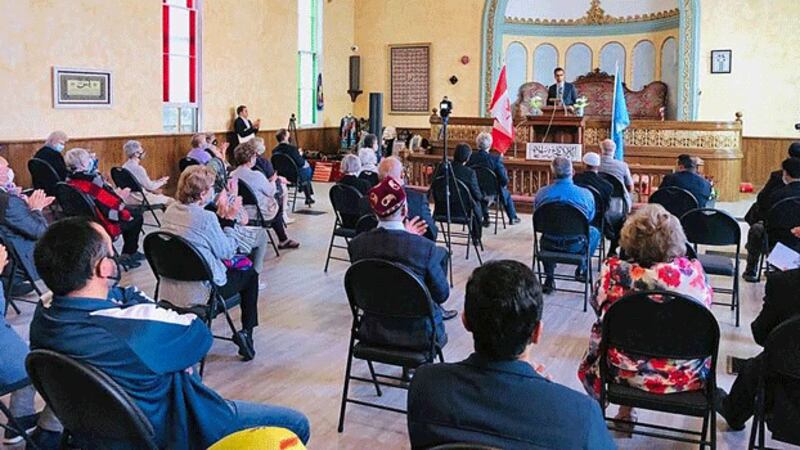With Koranic recitations and the raising of the blue and white crescent moon and star East Turkestan flag, Uyghurs in Canada opened a mosque and community center on the outskirts of Toronto in a renovated 150-year-old Roman Catholic Church to serve a community of 2,000 members of the Turkic ethnic group.
The East Turkestan Association of Canada — which uses Uyghurs’ preferred name for the Xinjiang Uyghur Autonomous Region (XUAR) in northwestern China —conceived the idea of a Canadian Uyghur center in 2008 and 13 years later bought the church building it for CAD $610,000 (U.S. $482,000) with donations from as far away as Germany and Australia, said Tuyghun Abduweli, president of the group.
“For Canadian Uyghurs, this shows what kinds of results unity and solidarity can and cannot achieve,” he told RFA’s Uyghur Service.
“The unity here in Canada [that] ultimately led us to purchase such a large church, which we then turned into a mosque to use for our own cultural, historical, and religious matters, is very exciting and inspiring to Uyghur Canadians.”
The opening ceremony drew members of the Uyghur community in Canada, a Canadian lawmaker, diplomats and officials, and leaders of two major Uyghur exile groups — Dolkun Isa, president of the Germany-based World Uyghur Congress, and Rushan Abbas, executive director of the U.S.-based Campaign for Uyghurs.
The East Turkestan Association of Canada also invited the Catholic pastor and former congregation of the church to raise awareness of the plight of the Uyghurs in the XUAR, said association member Itbiar Artish.
The Catholic congregation had been getting older, and church administrators could not afford to keep up the building, said Robin Wilkie, the last pastor of the church, after the opening ceremony on Sept. 25.
“And with COVID, they decided that it was time to sell. So that’s when the Uyghur community purchased the building from us, and so we hand the baton on to them to carry on their faith,” he said of the Italian Romanesque-style building built in 1873-1874.

Documented abuse
Xinjiang came under Chinese imperial rule during the Qing Dynasty in the 18th century. An East Turkestan state was declared in 1944, but was forcibly absorbed by the new People’s Republic of China five years later.
China has come under criticism for heavy-handed policies targeting the 12 million predominantly Muslim Uyghurs and other Turkic minorities in Xinjiang, destroying mosques, making Mandarin Chinese the main language in schools, monitoring Uyghurs’ moves with a pervasive and intrusive surveillance system, and using forced Uyghur labor at factories and farms.
Researchers have documented the incarceration by Chinese authorities of as many as 1.8 million Uyghurs and other Muslim minorities in a network of detention camps that Beijing claims are vocational training centers.
China rejects widespread and documented allegations that it has mistreated Muslims living in Xinjiang and keeps the region closed to independent researchers and journalists.
The United States and the legislatures in several European countries have deemed the treatment of Uyghurs and others in the XUAR as constituting genocide and crimes against humanity.
In February, the Canadian parliament passed a unanimous nonbinding motion declaring China’s treatment of the Uyghurs in the XUAR a genocide, becoming the second country after the U.S. to make that determination.
Lawmakers also included an amendment to the motion, calling on the International Olympic Committee to move the 2022 Winter Olympics from Beijing if the Chinese government continued its maltreatment of the minority group.
At the time, China strongly condemned and opposed the moves from Ottawa, saying Beijing had lodged representations with Canada.
About 2,000 Uyghurs — or 600 to 700 families — live in Canada, a country of 38 million people, Mehmet Tohti, executive director of the Uyghur Rights Advocacy Project in Canada, told the Canadian women's magazine Chatelaine in March.
Reported by Jilil Kashgary for RFA’s Uyghur Service. Translated by the Uyghur Service. Written in English by Roseanne Gerin.
